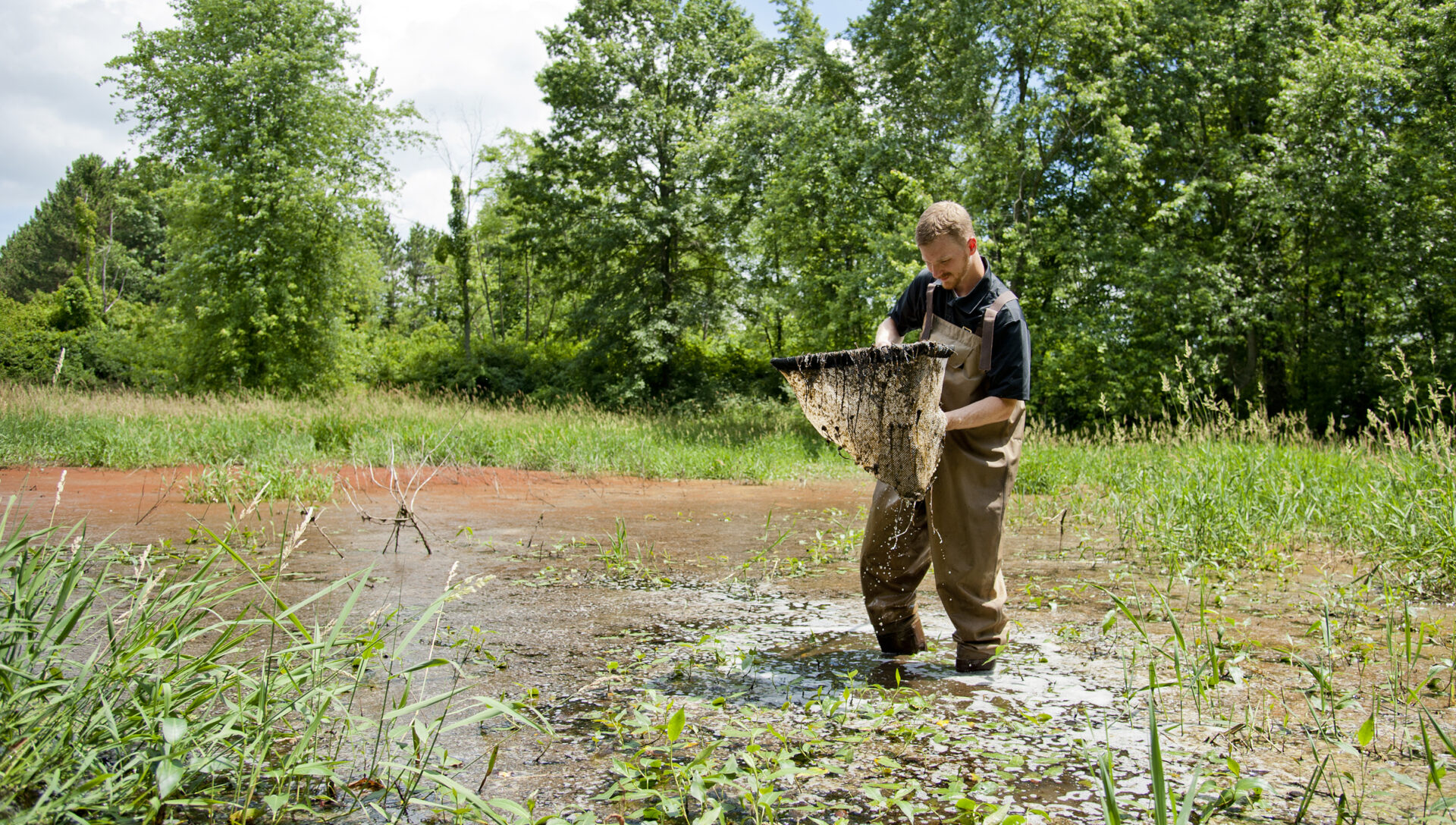Logan Billet, Master’s Student
Logan earned his bachelor’s degree in Biology from Allegheny College in 2017. He is interested in how anthropogenic stressors influence host-parasite relationships in aquatic systems. His research focuses on landscape patterns of pesticide tolerance in aquatic organisms and how evolved pesticide tolerance affects host-parasite interactions.
Meilssa Lech, Master’s Student
Melissa earned her bachelor’s degree in Biology from the University of South Carolina Upstate. She is broadly interested in the effects of anthropogenic activities on organisms, especially reptiles and amphibians. Her current research focuses on how sublethal exposures to per- and polyfluoroalkyl substances (PFAS) affect infection rates of ranavirus and parasites in amphibians.
Andrew Hopkins, PhD Student
Andrew received his bachelor’s from Eckerd College in Florida and Master’s from Western Michigan University. He is interested in studying the impacts of fungicides and other pesticides in long-term, low-dose studies and seeing how they impact growth, development and stress. He is also interested in looking at the interplay between disease and contaminants with a possible focus on Bd.
D. Riley Rackliffe, PhD Student
Riley is fascinated by aquatic ecology. He received his M.S. from Brigham Young University where he applied the field of ecosystem metabolism to the world of shallow wetland ponds. He’s worked in fisheries management with the Utah Division of Natural Resources and wilderness monitoring with the National Park Service. He is interested in phenotypic plasticity in response to anthropogenic pollutants as well as how human land use practices influence aquatic biodiversity and ecosystem function.
Wes Flynn, Post-doctoral scholar
Wes received his Ph.D. through the Odum School of Ecology and Savannah River Ecology Lab at the University of Georgia. His research examined the consequences of long-term environmental contamination on phenotypic and genetic variation in amphibians. This work also incorporated the roles of maternal effects, physiology, and gut microbial responses associated with environmental exposure to contaminants understand the immediate and long-term consequences of degraded environments. His current research examines how per-/polyfluorinated alkyl substance exposure risk varies with land use and life stage to inform effective ecological risk assessment.
Grace Coogan, Research technician
Grace earned her bachelor’s degree in Biology from Occidental College in 2017. She focused on marine biology in her studies and held positions in fisheries biology before coming to Purdue to work on amphibian exposure to per- and polyfluoroalkyl substances (PFAS). She hopes her experiences at Purdue will help inform her decisions in choosing a Master’s program in the next few years.
Matt Hamilton, Laboratory manager
Matt earned his bachelor’s degree in Wildlife Science from Purdue University in 2012 and his M.S. degree in Wildlife and Forest Resources from the University of Georgia. Matt’s thesis research focused on the effects of long-term stressors, such as contaminants, on the stress response, immune function, and population status of American alligators (Alligator mississippiensis) on the Savannah River Site in South Carolina.







Previous Post-doctoral Scholars
Jessica Hua
Jess investigated a broad range of questions related to the biology and conservation of aquatic systems. She was particularly interested in understanding how anthropogenic chemicals, such as pesticides, alter aquatic systems. She was also interested in understanding how diseases contribute to the ecology, evolution, and conservation of aquatic organisms. She is currently an assistant professor at Binghamton University.
Michael Chislock
Michael received his M.S and PhD from Auburn University. His research lies at the interface of population, community, and ecosystem ecology, and he is particularly interested in the role of adaptation and evolution in mediating the response of communities and ecosystems to global change. His current research interests include developing and field-testing models of predator-prey interactions that incorporate the role of predator and prey evolution in the context of eutrophication; biogeography; and evaluating the causes of success or failure of invasive species as well as the consequences caused by successful introductions. He is currently an assistant professor at SUNY Brockport.


Previous Graduate Students
Vanessa Wuerthner
Vanessa received her M.S. in 2015. Her research interest was disease ecology of amphibians with a focus on coinfection and priority effects.
Jesse Miles
Jesse received his M.S. in 2015. He conducted ecotoxicological research examining the lethal, sub-lethal, and trophic effects of the neonicotinoid clothianadin on aquatic communities.
Kate Pochini
Kate received her M.S. in 2016. She examined the interactive effects of pathogens and pesticides on amphibians.
Samantha Gallagher
Sam received her M.S. in 2017. Her research examined the effects of pesticides and pathogens on respiration rates of larval amphibians.
Sarah Abercrombie
Sarah received her M.S. in 2018. Her research investigated the sub-lethal effects of perfluoroalkyl and polyfluoroalkyl substances on amphibians.
Turner DeBlieux
Turner received his M.S. in 2018. His research examined natural enemy ecology and contrasted the effects of predators vs. pathogens on amphibians communities.






Previous Technicians
Brian Tornabene
Brian is currently at the University of Montana working towards his PhD.
Mike Iacchetta
Mike is currently a researcher at the USGS in Oregon.




